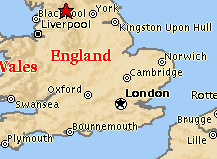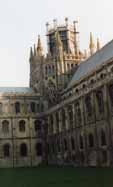


For four years, from January 1997 to January 2001, we lived in the shire of Suffolk, southeast England, between Cambridge and Norwich on the above map. This community provides the perfect starting point for various adventures around England. Just seventy miles to the south, and easily accessible by automobile, bus and train is London. There are many outdoor recreational activities located in every direction, including the beautiful white sand beaches of Norfolk and hiking through the fenlands. If you are interested in historical sites, there are plenty of castles, cathedrals and other places importance from thousands of years of English history, within just a short drive. English Heritage and the National Trust are excellent sources of information.
We lived near two bases, RAF Lakenheath, RAF Mildenhall and RAF Feltwell communities. These bases house a variety of military commands, each providing vital mission support around the world. The 48th Fighter Wing is our command sponsor.

England is known as the "Garden of the World" because of the lovely flowers, which brighten what could otherwise be a gloomy environment. The weather tends to be rather temperate, not very cold and not very hot, but very damp. Rain and fog are regular weather events, though the sun does shine regularly too. Since the weather fronts are often thin bands of clouds followed by clear, sunny skies, the sky is often filled with lovely double rainbows. Snow is unusual here, though the temperature does cool enough to leave heavy winter frost on the windows and grass. The summers tend to be warm but not hot.
Spring begins in East Anglia in February as the daffodils begin to peek their heads above the surface of the ground, and the countryside is filled with colour from that point through summer. Wildflowers bloom everywhere, in fields, gardens and along the sides of the roads. Lavender is produced in this region, giving the fields a lovely purple hue. Fields covered in yellow are producing either mustard or linseed. The farmers in this area also grow carrots, grain, pigs and sheep. The ancient country cottages along the tiny roads around the base have typical English gardens, filled with pansies and other flowers throughout the year.

The proximity of so many interesting places gives the teachers plenty of choice for class field trips. Each year, classes visit many local zoos and aquariums to study animals; museums in London to study science and natural history; the theatre to see live performances of pantomime and other events. The Third Grade schedules a trip to a lovely old manor house called Kentwell Hall, to experience life in a century long ago. The Fourth Grade takes a trip on a train to the ancient city of York, known for its importance during Roman times as well as throughout the rest of English history. These learning opportunities give the children a deeper understanding of the history and culture of England and provide experiences they could never get in the US.

The tiny villages of Anglia are quaint, with thatched roof cottages and 16th century pubs. Each village has a church, often dating from the 12th century. The church is a meeting place, not only for religious services but also for political and social events. The pubs are venues for food and drink, but also are used as meeting places throughout the year for village events. The larger villages and towns, such as Ely and Bury St. Edmunds have markets, a place to meet and greet family and friends while purchasing fresh local and imported fruits and vegetables. These markets have operated on a regular basis for hundreds of years, having been given special approval by the king. The sprouts and carrots have the best taste.
English culture is somewhat different than the US, though the differences are fading each year. They say we are two countries divided by a common language, and this is true. Conversations between locals and Americans can end in frustration at the difference use and pronunciation of words. Have you seen "My Fair Lady?" You will gain a deeper understanding of that story as you hear the multitude of different dialects on this tiny island. Shopping is different, there is not a 7/11 or McDonald's on every corner. The closest suburban mall is an hour away, though the larger market towns have nice shopping districts. Prices are more expensive, especially when you consider the exchange rate, however bargains can be found. There are a number of outlet centres around the country, particularly in Stoke-on-Trent, a mere 2-3 hour drive. There you will find fine English china for outrageously cheap prices.

There was once a cartoon about English TV. At the bar in a pub sat three Americans drinking some pints of ale, with a TV in the corner. The barkeep says to the men, "You yanks are going to love British TV." On the TV was the lineup for the evening, "Friends," "Frasier," and "ER." British television is somewhat different. We pay a tax to have a TV which plays British programming, and if you do not pay the tax, you can be fined a great deal of money. The BBC plays some interesting shows, particularly real life adventures like "Airport," a documentary program about Heathrow Airport. There are similar shows, like "Lakeside," about the mall, "Vet Hospital," and "Hampton Court Palace." They also enjoy game shows. You've heard of "Who wants to be a Millionaire." That show was created as a publicity stunt for one of the British tabloids. Most of their game shows do not pay off so big. As a matter of fact, the prize for many of the game shows is simply the honour of winning. Of course, the commercials are interesting too, sometimes more interesting than the program. TV in the UK has changed dramatically over the last decade. The days of one station has long since gone with the advent of cable systems. Radio is also beginning to change as more privately run stations begin to air.
As you can see, Lakenheath is certainly an interesting place to work, live and play!